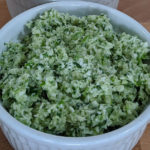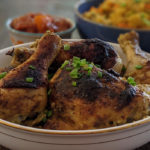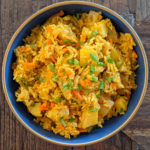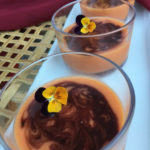Mohamed Ali
Project Feast graduate, 2019
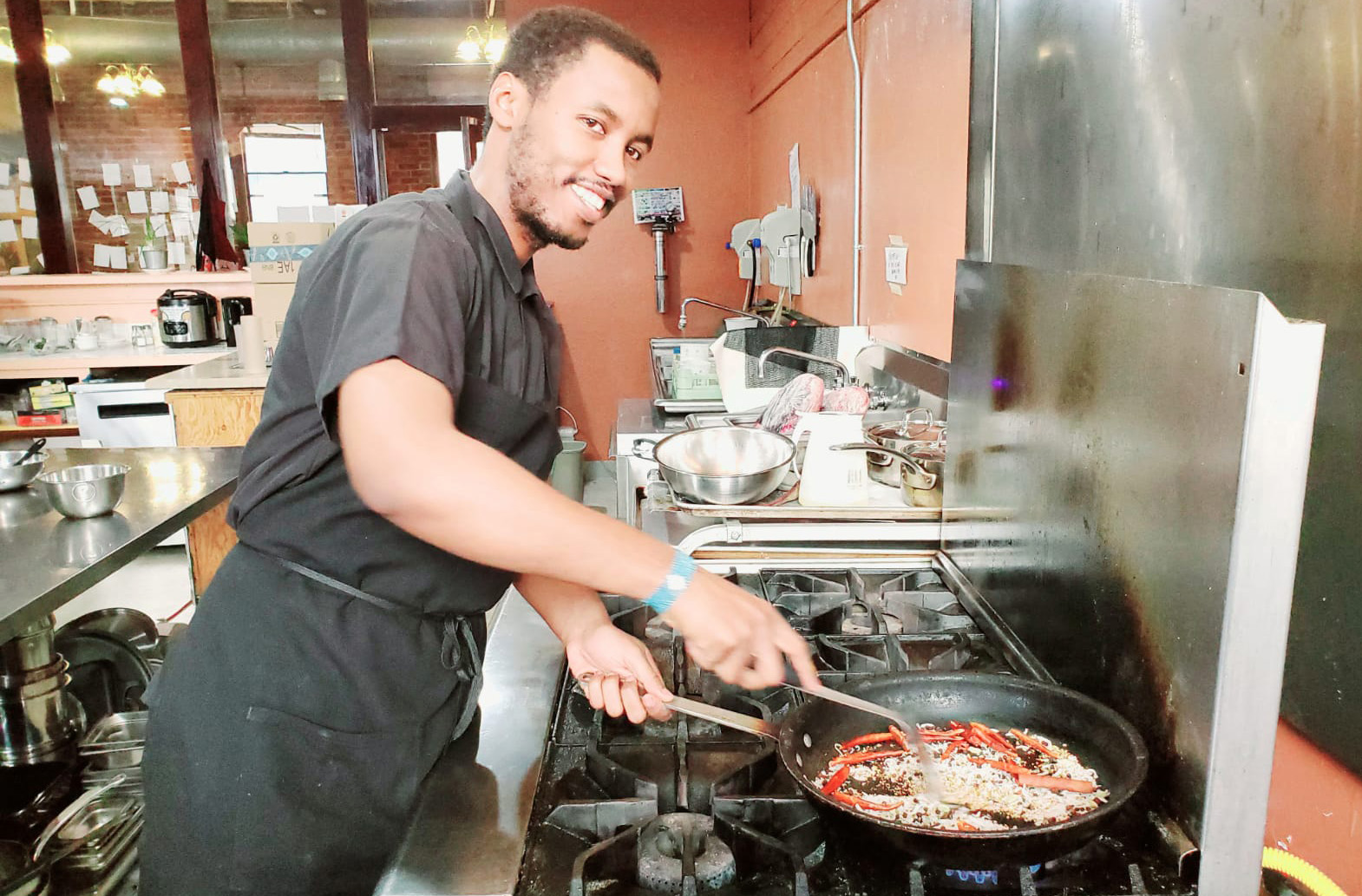
“With food you bring a lot of people together. That feeling is so joyful.”
Mohamed completed his Project Feast apprenticeship at the end of 2019. He hopes to open his own restaurant someday.
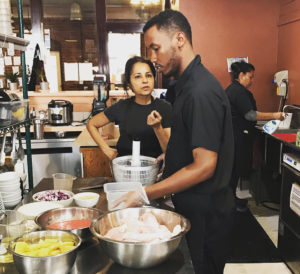
Mohamed and chef instructor Kausar Ahmed prepare Somali dishes for a “Migrating Meals” dinner in fall 2019.
Mohamed Ali’s Project Feast instructors and classmates describe him as a talented cook, a diligent student and a dedicated family man. They’ve learned to make his golden Zurbiyan rice, rich with vegetables and the warmth of his xawaash spice blend. And over and over, they say the same thing: “He’s our storyteller.”
At team lunch, while driving to catering jobs and in the kitchen, Mohamed’s stories flow. He tells of growing up in Mogadishu, fleeing war while a teen, and supporting himself in Malaysia until the United Nations High Commissioner for Refugees (UNHCR) gave him word that he could start a new life in the United States. He talks about adjusting to the cold of South Dakota, wearing two pairs of jeans and two jackets. He tells of the family he misses in Kenya, Somalia and Saudi Arabia. And he talks about food – the food he ate as a child, the food he loves to cook now, and his dreams of owning his own restaurant.
One morning at the end of 2019, Mohamed came into Ubuntu Street Cafe early before class to share his story:
“WHEN I WAS BORN IN 1991, Somalia was having a difficult time. When war started, we moved far away from the city to be safe. When it was over, we came back. War was still going on sometimes, but life was going on, too.
My father used to cook for big events like weddings. He would make rice and grill any type of meat. My mom also was a good cook for sweets. I didn’t usually cook then – you know, how it is when your mother is a good cook and your father, too. When my mother went to Saudi Arabia to work and left my father and brothers alone, my dad would go to work and he would tell us to cook.
I used to go to school. I loved learning. I wanted to become an engineer or something. I loved the environment, the teachers, everything. And then war happened again. This time it was bad, bombing everywhere. When you left home, you never knew if you were coming back alive.
I called my mother and said, ‘I want a safer place, wherever it is.’ Everybody was going to Libya, and then to Europe, but that is extremely dangerous. Some people get kidnapped. One of my aunties said, ‘I know someone who lives in Malaysia. There is a UNHCR there. They can make a case to bring him somewhere to start a good future.’
IT WAS 2008 AND I WAS 17 when I left. I went to Malaysia and people said after six months, you’ll get a sponsor and they’re going to send you to a good country. I waited a long time. Almost five and a half years.
In Malaysia, it’s very difficult to get a job. They have a lot of people and they’re not used to foreign people. I found a Somali restaurant inside the university. I started as a dishwasher. Then, I moved up to cutting vegetables and helped out the chef. I made beef suqaar – beef cut in small pieces. You put vegetables in and stir-fry. The chef used to cook that every day, and people loved it. He was a good cook, and he would always push me to learn.
Imagine a teenage boy who has run away from war. Your mind is up and down, you don’t have your family around and you’re very young. It’s tough to choose a career right away. I didn’t learn from the chef so much then, but I remember what he was saying. Some of the teaching benefits me nowadays.
In 2013, December 17, I left Malaysia. I ended up in Sioux Falls, South Dakota. When I came to the United States, I used to cook all the time at home. When you come from a different country, it takes awhile to adapt to the food. I love cooking.
In 2015. I went to Alaska. At first, I was working at a salmon processing plan. Then I applied for a boat. Every day you’re looking for the big money. The job and the cold weather were very hard. I got sick and went back to South Dakota. After another year, I moved to Seattle because it’s closer to Alaska. I applied again to the fishing boats. This time it was pollock. I worked three seasons.
Then I went back close to home, to Kenya, to get married. My wife and I knew each other when we were little. When I moved to Malaysia, we used to chat. When I was in Sioux Falls, I decided to talk to her about a long-term relationship. She said, ‘Give me time.’ After a couple of days, she said ‘I’m good.’ We got married in January 2019. Now, she is pregnant. She’s having a girl.
I just applied to be a citizen, which is going to take some time. First I’ll go to Alaska to make some money, and then I’ll go to see her. When I become a citizen, I’m planning to bring my family here.
In 2019, when I came back from Africa, I was working and I went to Highline College to learn English. One day, I was checking online for how to become a professional chef, how to work in the industry of food, or have your own coffee shop or restaurant. I kept thinking, ‘You already have this experience with cooking. You love cooking.’ So, I decided to find something that would give me some skills in the short-term.
BACK HOME, if you want to open a restaurant, it’s so easy. You just open a restaurant and start cooking. But here, you have to follow different rules: Department of Health, licensing, permits, a lot of stuff that you’ve got to know. So, I asked at Highline College if they have that kind of program. On the list was Project Feast. They said they teach you how to become a food business owner.
I am so lucky to join this team and learn from them. Hearing stories and writing down recipes, I have learned a lot. In the future, I’m thinking I will open my own restaurant. If you know the skills, it’s easier to plan. For a restaurant, I’m still thinking, but I have some recipes. A papaya dessert. Corn grits because it’s traditional, specifically Somali. With food you bring a lot of people together. That feeling is so joyful.
I have a big family to support. This four months [in 2019] is the only time I’ve gone to school. Still I have work, but I push myself. I don’t get enough sleep. The thing that keeps pushing me to finish is to do something for my future and people who need me.
Veena [Prasad] started Project Feast from scratch, and a lot of people have their own business now. She made some people’s dreams come true. She worked very hard. When you have the ability to help people, even if it takes you some time, you should do it.”
– Interviewed by Denise Clifton, Tandemvines Media
Editor’s note: Mohamed’s plan was to travel to Kenya after the 2020 Alaska fishing season to see his wife and new baby daughter. Project Feast hasn’t heard any updates, and hopes the family was reunited this year. Mohamed’s interview is lightly edited for length and clarity.
Baasbas: Cilantro-Coconut Chutney
Ingredients
- 1 cup fresh sliced/shredded coconut
- 1 cup cilantro roughly chopped
- 1 to 2 green serrano peppers more if you like it spicy
- 1 garlic clove
- 1 small onion
- 1 lemon juiced
- 1 tsp salt
- 1/4 cup canola oil
- Water as required for consistency
Instructions
- 1. Combine all ingredients in a food processor, and pulse to blend.
- 2. Add water until desired consistency – chunky like a pesto or smooth like hot sauce.
- Makes about 2 cups
Nafaqo: Potatoes Stuffed with Egg
Ingredients
- 2 large potatoes boiled peeled and mashed
- 1 tsp cumin powder
- 1 tsp coriander powder
- 1/2 tsp turmeric
- 1 tsp salt
- 1/2 tsp black pepper
- 5 boiled eggs
- 2 eggs whisked
- Bread crumbs
- Oil for frying
Instructions
- 1. Place the whisked egg in a large shallow bowl. Place the bread crumbs in another shallow bowl.
- 2. Add the spices to the mashed potatoes. Mix gently and then divide into 5 portions
- 3. Roll one portion into a ball and flatten it into a patty.
- 4. Place a hard-boiled egg in the middle.
- 5. Fold the mixture around the egg to make an oblong shape, making sure the egg is covered completely by the potato.
- 6. Roll it in the whisked egg and then in the breadcrumbs.
- 7. Fry in the vegetable oil using medium heat for 10 minutes until golden brown. Drain on paper towels
- Serves 5
Xawaash Spice Mix
Ingredients
- 1/2 cup cumin seeds
- 1/2 cup coriander seeds
- 2 tbsp black peppercorns
- 1 tbsp cinnamon bark
- 1 tbsp cardamom pods
- 1 tsp cloves
- 2 tbsp turmeric powder
Instructions
- Dry roast all the ingredients, cool and grind.
- Makes about 1 ½ cups. Use in Zurbiyan chicken recipe.
Zurbiyan: Somali Chicken and Rice
Ingredients
- 1/4 cup vegetable oil
- 1 medium onion chopped
- 4 garlic clove minced
- 2 tsp ginger grated
- 1 ½ lbs chicken thighs or drumsticks
- 4 tsp xawaash spice mix divided into 2 tsp portions
- 1/2 tsp ground cardamom
- 1/2 tsp ground cinnamon
- 1/4 tsp ground turmeric
- 1/4 tsp ground black pepper
- 2 tsp salt
- 2 medium tomatoes chopped
- 1 cup plain yogurt
- 2 medium potatoes diced into ½ inch cubes
- 2 1/2 cups hot water
- 2 cups basmati rice
- 6 cups water
- 2 tbs salt
- 1/2 cup cilantro chopped
- pinch of saffron soaked in 1/4 cup hot water
Instructions
- 1. Heat the oil in a large heavy-bottomed saucepan over medium heat and fry the onions until deep golden brown, 10-12 minutes. Add the garlic and ginger, stir-fry for a minute more. Add the meat and cook for 3-5 minutes or until it changes color.
- 2. Add the xawaash spice mix, cardamom, cinnamon, turmeric, black pepper, and salt. Stir fry for 1 minute until fragrant. Add the yogurt, tomatoes and potatoes, mixing well with the meat.
- 3. Add the hot water and stir well, then cover and cook over medium heat for 20 minutes, until the sauce cooks down to a thick curry. Stir well to combine.
- 4. In a separate pan, boil 6 cups of water and add 2 tbs salt. Wash the rice and add to the boiling water and cook for 8 minutes, then drain. It should be parboiled.
- 5. Add the fresh cilantro to the pot with the meat and stir well to combine. Add the rice to cover the meat and even out the top (do not stir the rice into the curry).
- 6. Drizzle the saffron mixture over the rice.
- 7. Cover and cook over very low heat for 25 minutes.
- 8. Check rice for doneness. To serve, scoop out some rice, top with chicken, and serve with basbaas sauce.
- Serves 4
Furalato
Ingredients
- 1 medium papaya peeled, seeds discarded, flesh chopped into large chunks
- 2 cups whole milk
- 1/4 cup sugar
- Vimto fruit cordial syrup
- Edible flower for garnish optional
Instructions
- 1. Combine first three ingredients in a blender and blend together.
- 2. Pour into serving containers (glass ramekins, small mason jars, etc). Swirl in vimto. Chill until ready to serve.
- 3. Top with additional Vimto and edible flower (if using).
- Makes 4 1-cup servings

